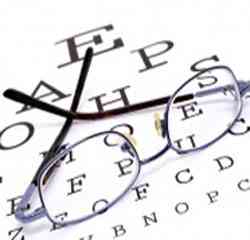Vision Care and Canadian Health Insurance
By Krista DeKuyper | September 14, 2023 |

Vision Care Coverage Table of Contents
- Visioncare Basics
- Personal Health Insurance and Vision Care
- Vision Costs Never Covered by Private Health Plans
- Vision Care via Employee Benefits
- Vision Coverage from Provincial Healthcare Plans
- Alberta
- British Columbia
- Manitoba
- New Brunswick
- Newfoundland
- North West Territories
- Nova Scotia
- Ontario
- PEI
- Saskatchewan
- Yukon
Last updated: March, 2019
Introduction
In this InfoDesk article we discuss vision care coverage offered by private health insurance plans such as employee benefits and individual health insurance. In addition, we also look at the (minimal) coverage provided by publicly funded provincial healthcare plans (i.e. the Canadian healthcare system). Specialty visioncare programs offered by the provincial governments are also listed for convenience.
Vision Care Coverage Basics
Vision care simply refers to coverage for costs associated with our eye sight.
Vision care doctors are classified as either optometrists or ophthalmologists. Both of these types of doctors are trained to perform eye examinations and recommend various eye treatments.
An optometrist has a Doctor of Optometry degree, while an ophthalmologist has a regular Doctor of Medicine degree that incorporates special vision care training.
Vision care usually entails:
- Examinations by a qualified doctor (optometrists always covered, while only the Blue Vision Global plan covers ophthalmologists)
- Prescription eye glasses (lenses and frames, including sunglasses)
- Contact lenses
- Laser eye surgery
There are two main sources of vision care coverage: publicly-funded provincial healthcare plans and private health insurance. These private plans cover vision care (and other) things that are not covered by provincial healthcare. In addition, there are two main types of private health insurance: employee benefits (group insurance obtained through an employer) and individual health and dental plans (also referred to as “personal health insurance” or “family health insurance”).
Personal Health Insurance and Vision Care
Many personal (i.e. individual) health insurance plans partially cover vision care expenses. The amount and type of coverage varies, depending on the particular health insurance plan.
Vision care expenses that may be fully or partially covered are:
- Eye examinations
- Prescription eye glasses (lenses and frames)
- Corrective laser surgery
- Prescription contact lenses
- Visual training aids (e.g. eye patches)
Note that maximum amounts of coverage differ between insurance companies. There may also be a waiting period before vision benefits commence.
Refer to the following for a summary of vision care coverage (you can click on the plan name for full coverage details):
| Plan | Lenses, Frames & Laser Surgery |
Optometrist Exams | Waiting Period | Other |
| Flexcare (all plans) |
– 100% coverage with no deductible. – $250 maximum per person every 2 years except ComboPlus Starter plan – ComboPlus Starter plan: $150 maximum every 2 years – Additional coverage available via Enhanced Vision add-on (click here for more): $500 maximum every 3 years ($100 maximum for laser eye surgery). |
$70 maximum for Optometrist fees every 2 years (all plans) | No | No requirement for change in vision prescription for subsequent coverage |
| Blue Vision Global Plan | – Coverage available with Extended health benefits (not available with Regular health benefits) – 100% coverage per person with no deductible to a maximum of $150 every 2 years |
– Maximum of $50 every two years | 3 month waiting period | – Visual training aids covered such as eye patches – Covers ophthalmologist exam |
| Sun Life Personal Health Insurance (PHI) |
– Coverage available with Standard and Enhanced plans (not available with Basic plan) – 100% coverage with no deductible. – Standard plan: $150 maximum per person every 2 years – Enhanced plan: $200 maximum every 2 years |
$50 maximum per person every 2 years (part of overall maximum to the left) | 1 year waiting period | None |
| Sonata Health | – 100% coverage with no deductibles – Core Plan: max. of $150 per person every 2 years – Core Plus Plan: max. of $200 per person every 2 years – Elite Plan: max. of $250 per person every 2 years |
$75 maximum per person every 2 years for eye exams | No | None |
| FollowMe | – Coverage available for all FollowMe health plans – 100% coverage with no deductibles – Basic plan: maximum of $150 per person every 2 years – Enhanced and Enhanced Plus plans: maximum of $200 per person every 2 years – Premiere plan: maximum of $300 per person every 2 years |
$60 maximum per person every 2 years for optometrist eye exam | No | None |
| Blue Vision Express Plan | – No coverage for eye glasses or laser surgery | – $50 maximum per person every 2 years for eye exam – Coverage until age 65 |
No | – Covers ophthalmologist as well as optometrist exam |
Vision Care via Employee Benefits
Employee benefits (health insurance obtained through an employer) usually, though not always, has coverage for vision care costs.
Oftentimes vision care is a 2-year benefit, which means that it comes up for renewal every other year.
Note that coverage usually:
- Is 100% for optometrist exams, glasses, contact lenses and frames.
- Has a maximum of $50 every two years for optometrist exams.
- Has a maximum of $100 to $400 every two years for glasses, contact lenses and frames.
Some group plans may also cover a percentage of the costs for laser eye surgery.
Vision Costs Never Covered by Private Health Plans
The following vision related expenses are never covered by private health insurance plans:
- Cosmetic type vision related procedures (e.g. correcting droopy eye lids)
- Industrial safety glasses
Vision Care Coverage from Provincial Healthcare Plans
Provincial healthcare plans vary in their coverage of vision care costs.
Generally speaking most provincial healthcare plans do not cover vision care unless the resident is either under the age of 18 or 65 or older, after which routine eye examination fees covered (the exception to this is the North West Territories provincial healthcare plan).
Prescription eyeglasses, contact lenses, etc. that are recommended by an eye doctor are usually not covered by provincial plans.
However, an eye examination MAY be covered for any age if it is deemed “medically necessary” (e.g. an eye disease, injury due to trauma, or a possible risk to the eyes from a disease like diabetes). Ask your doctor when in doubt about medically necessary eye procedures. Note that this is province-specific!
Refer to the following list for full details for each provincial healthcare plan:
AHCIP (Alberta Health Care Insurance Plan)
- Never covers optometrist services performed out of province.
- Children 18 years or less and seniors 65 or older are eligible for: one complete eye exam; one partial eye exam; and one diagnostic eye procedure per year.
- Alberta residents 19 to 64 years old that require an eye examination caused by a medical condition, trauma or illness MAY be eligible for benefits. Consult your doctor to see if you qualify for coverage!
- No coverage for prescription eye glasses, contact lenses, etc.
- Seniors with low-moderate incomes may qualify for some vision care (e.g. prescription eye glasses) via the Dental and Optical Assistance for Seniors program.
Health Insurance BC (British Columbia)
- No coverage for routine eye examinations aged 19-64.
- Eye exams that are medically required (e.g. a result of an eye disease, injury, or possible risk to the eyes from a disease like diabetes). Ask your doctor if an eye examination is medically necessary. Covers both ophthalmologists and optometrists.
- Routine eye examinations ages 18 and under as well as 65 or older.
- No coverage for prescription eye glasses, contact lenses, etc.
Manitoba Health
- Covers one routine eye exam every 2 years for residents who are under 19 years old or over the age of 64.
- Does not cover prescribed eye glasses, contact lenses, etc. UNLESS you are a senior (aged 65 and up) who qualifies for the Senior’s Eyeglass Program ($50 deductible).
- May cover an eye examination if deemed medically necessary.
New Brunswick Medicare
- No standard coverage for vision care expenses (e.g. exams, glasses, etc.).
- If you are receiving social assistance and qualify for the Health Services Vision Program then you may be covered for eye exams, frames, corrective lenses and cases.
- Children of low-income families that qualify for the “Healthy Smiles, Clear Vision” program may be eligible to receive compensation for vision care expenses such as exams, lenses and frames.
Newfoundland Medical Care Plan (MCP)
- If you are receiving Income Support then you may qualify for $55 for an eye exam (once per year for children and once every 3 years for adults).
- If you are receiving Income Support then you may qualify for financial support to partially cover the cost of eye glasses ($125 for single lenses and $175 for bi-focals). Assistance available once every 3 years for adults and once every year for children.
North West Territories Health Care Plan
- Coverage for all ages for eye examinations and treatment provided by an ophthalmologist only (optometrists are NOT covered).
- Eye glasses are usually not covered. Exceptions are qualifying Metis or seniors (see below).
- The Métis Health Benefits program offers Metis coverage for new eye glasses every two years for adults (18 and up) and every year for children and teens (under 18). Contact lenses may also be eligible for coverage if prescribed by an ophthalmologist for several specific conditions.
- The Extended Health Benefits Seniors program offers non-aboriginal and Metis seniors aged 60 and up coverage for eye glasses, frames and contact lenses.
- Note: native (First Nations and Inuit) NWT residents get vision care coverage via the federal “Non-Insured Health Benefits (NIHB) Program”.
Nova Scotia MSI (Medical Services Insurance)
- No coverage for eye examinations for residents aged 10-64.
- Covers one routine eye examination every two years for residents 9 years old or less and residents who are 65 or older.
- No coverage for prescription eye glasses, contact lenses, etc.
- Residents may be covered for health conditions related to eye health (e.g. diabetes).
Ontario Health Insurance Plan (OHIP)
- Coverage for routine eye examinations for residents under the age of 20 or 65 and older (eye exams for all other ages are not covered).
- No coverage for prescription eye glasses, contact lenses, etc.
- Residents aged 20-64 MAY be eligible for vision care coverage if their eye sight can be affected by various ailments such as: diabetes mellitus, glaucoma, cataracts, strabismus, amblyopia, visual field defects, uveitis, retinal disease, corneal disease or optic pathway disease.
- Residents that are receiving assistance via Ontario Works, Ontario Disability Support Program or the Family Benefits Program are covered for one routine eye examination every two years.
Health PEI
- No coverage for prescription eye glasses, contact lenses, etc.
- No coverage for optometrist fees.
- The exception to above is the “Eye See … Eye Learn” program, which offers one eye exam and one pair of glasses (if necessary) to children enrolled in PEI kindergarten.
Saskatchewan Health
- If a resident is: under 18 years old or; receiving a Senior’s Income Plan (SIP) supplement or; receiving benefits from the Supplementary Health Benefits or Family Health Benefits programs, then that resident is eligible for the following vision care coverage:
- Routine eye examination (one every two years if between 18 and 64 years old, OR one exam every year for all other ages).
- Partial eye examinations (except when the optometrist provides this service within 90 days of a routine eye exam mentioned above).
- Examinations by an optometrist are also covered if you have diabetes (Type I and II) or have suffered some eye trauma that makes the exam medically necessary.
- There is no coverage for eye exams if you do not meet one of the requirements mentioned above.
- Eye glasses are usually not covered. The exceptions to this are children who are enrolled in the Family Health Benefits program (limited coverage for basic glasses).
Yukon Health Care Insurance Plan
- Children under the age of 19 years old from low-income families get vision benefits via the Children’s Drug and Optical Program as follows:
- One eye examination every other year.
- One set of glasses every two years (to a maximum of $200).
- Contact lenses if medically necessary.
- No vision care costs (eye exams by optometrists, glasses, lenses, etc.) are covered for other residents.
Conclusion
We hope you have found this article about vision care helpful. Please feel free to leave us a comment below if you would like to “see” something added!






























